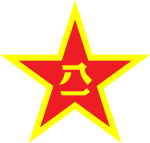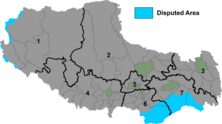You can help expand this article with text translated from
the corresponding article in Chinese. (January 2021) Click [show] for important translation instructions.
|
This article includes a list of general
references, but it lacks sufficient corresponding
inline citations. (January 2017) |
| Western Theater Command | |
|---|---|
| 西部战区 | |
 | |
| Founded | 1 February 2016 |
| Country | |
| Allegiance | |
| Type | Theater Command |
| Role | Command and control |
| Part of | |
| Headquarters | Chengdu, Sichuan |
| Website | Official website (in English) |
| Commanders | |
| Commander | General Wang Haijiang |
| Political Commisar | General Li Fengbiao |
| Chief of Staff | General Zhang Jian |
| Insignia | |
| Sleeve insignia |
 |
|
Armed Forces of the People's Republic of China |
|---|
 |
| Executive departments |
| Staff |
| Services |
| Independent troops |
| Special operations force |
| Other troops |
| Military districts |
| History of the Chinese military |
| Military ranks of China |
The Western Theater Command ( Chinese: 西部战区; pinyin: Xībù zhànqū) is one of the five theater commands of the People's Liberation Army, founded on 1 February 2016.
Its jurisdiction includes Sichuan, Tibet, Gansu, Ningxia, Qinghai, Xinjiang, Shaanxi, Yunnan, Chongqing. [1] Guizhou is also sometimes listed as part of the command. [1] Its current commander since August 2021 is General Wang Haijiang. [2] Its current political commissar is General Li Fengbiao.
In May 2016, the PRC raised the rank and status of its western Tibet Military Command to widen its scope for missions and combat preparedness, in a move analysts in Beijing said was aimed in part at fortifying the border with India. [3] The Xinjiang Military Command may also be elevated in the future, the report said. Both commands are under the newly created Western Theater Command, the largest of five newly reorganised military regions of the PLA. The Chinese Communist Party-run tabloid Global Times reported the change would allow the command “to shoulder more combat assignments”. [3]
Area of Responsibility (AOR)
Western Theater Command's Area of Responsibility (AOR) consists of India, South Asia, Central Asia, Western Mongolia, Pakistan and Afghanistan
Organizational structure
The Western Theater Command consists of the following components:
- Western Theater Command Ground Force
-
Western Theater Command Air Force
- 33rd Fighter Division
- 44th Fighter Division
- 6th Fighter Division
- 36th Bomber Division
- 37th Fighter Division
- 4th Transport Division[ citation needed]
Official hymn
Released on 4 November 2020, the Western Theater Command released "The Battle Hymn of the Western Theater Command" ( Chinese: 西部战区战歌; pinyin: Xībù zhànqū zhàngē) with lyrics written by the then commander of the Western Theater Command, General Zhao Zongqi and music composed by Luan Kai. [4]
Context
In the context of China–India relations, the Line of Actual Control (LAC) is the border between India and China which has led to ongoing Sino-Indian border dispute. The China's Western Theater Command is focused on its border with India and the western and northwestern neighbors such as Pakistan, Afghanistan, Tajikistan, Kyrgyzstan, Kazakhstan, Russia and Mongolia. China has numerous territorial disputes with several of these neighbors.
Counter-deployment by India
Indo-Tibetan Border Police (ITBP) and Indian Military patrol Indian border, which consists of East, Central and Western Command on LAC of India. Both India and China have developed India-China border infrastructure, including the India-China Border Roads (ICBR) by India.
Indian Military has divided the LAC into 3 sectors - the northern sector (some times also called western sector) across Ladakh and the Chinese-held Aksai Chin, the central sector across Himachal Pradesh and Uttrakhand states, and the eastern sector across Sikkim and Arunachal Pradesh states. [5] [6] India has the Patrol Points (PP) on the border with Chinese, some of which are disputed by China. [7] [8] [9] There are Indian air bases and advanced landing grounds (ALG) along China border.
There are designated Border Personnel Meeting Point, mutually agreed by India and China, for conducting meetings to resolve the dispute. [7]
See also
- Territorial disputes of the People's Republic of China
- List of People's Liberation Army Air Force airbases
References
- ^ a b Sumit Ganguly; Andrew Scobell; Joseph Chinyong Liow, eds. (2017). The Routledge Handbook of Asian Security Studies. Routledge. ISBN 978-1315455631. Archived from the original on July 30, 2022. Retrieved July 30, 2022.
- ^ "Chinese President Xi appoints new General for PLA's Western Theatre Command amidst Ladakh standoff". economictimes. Archived from the original on January 31, 2022. Retrieved December 20, 2020.
- ^ a b "Eye on India, China raises Tibet military command rank | Central Tibetan Administration". tibet.net. Archived from the original on November 7, 2016. Retrieved October 1, 2016.
- ^ "[军事报道]西部战区官方公众号上线 首日推出《西部战区战歌》" [[Military Report] "Western Theater War Song" was launched on the first day of the official public account of the Western Theater]. China Central Television (in Chinese). November 4, 2020.
- ^ India-China War: US Study Explains Why Indian Air Force Could Outgun China In A Border Conflict Archived 27 July 2020 at the Wayback Machine, Eurasian Times, 24 July 2020.
- ^ "Twisting India's Chicken's Neck". lowyinstitute.org. Archived from the original on July 18, 2020. Retrieved July 18, 2020.
- ^ a b Subramanian, Nirupama; Kaushik, Krishn (September 20, 2020). "Month before standoff, China blocked 5 patrol points in Depsang". The Indian Express. Retrieved September 27, 2020.
- ^ Singh, Sushant (July 13, 2020). "Patrolling Points: What do these markers on the LAC signify?". The Indian Express. Retrieved September 27, 2020.
- ^ "India-China LAC Standoff: Know what are patrolling points and what do they signify". The Financial Express. July 9, 2020. Retrieved September 27, 2020.
Further reading
- Kenneth Allen, Dennis J. Blasko, John F. Corbett (February 4, 2016).
"The PLA's New Organizational Structure: What is Known, Unknown and Speculation (Part 1)". The Jamestown Foundation. Retrieved February 27, 2016.
{{ cite web}}: CS1 maint: multiple names: authors list ( link) - Kevin McCauley, Snapshot: China’s Western Theater Command, China Brief Volume: 17 Issue: 1, Jamestown Foundation, 2017.
- Rupprecht, Andreas: Flashpoint China, Chinese air power and regional security; Harpia Publishing, ISBN 978-0-9854554-8-4, 2016 [1]

